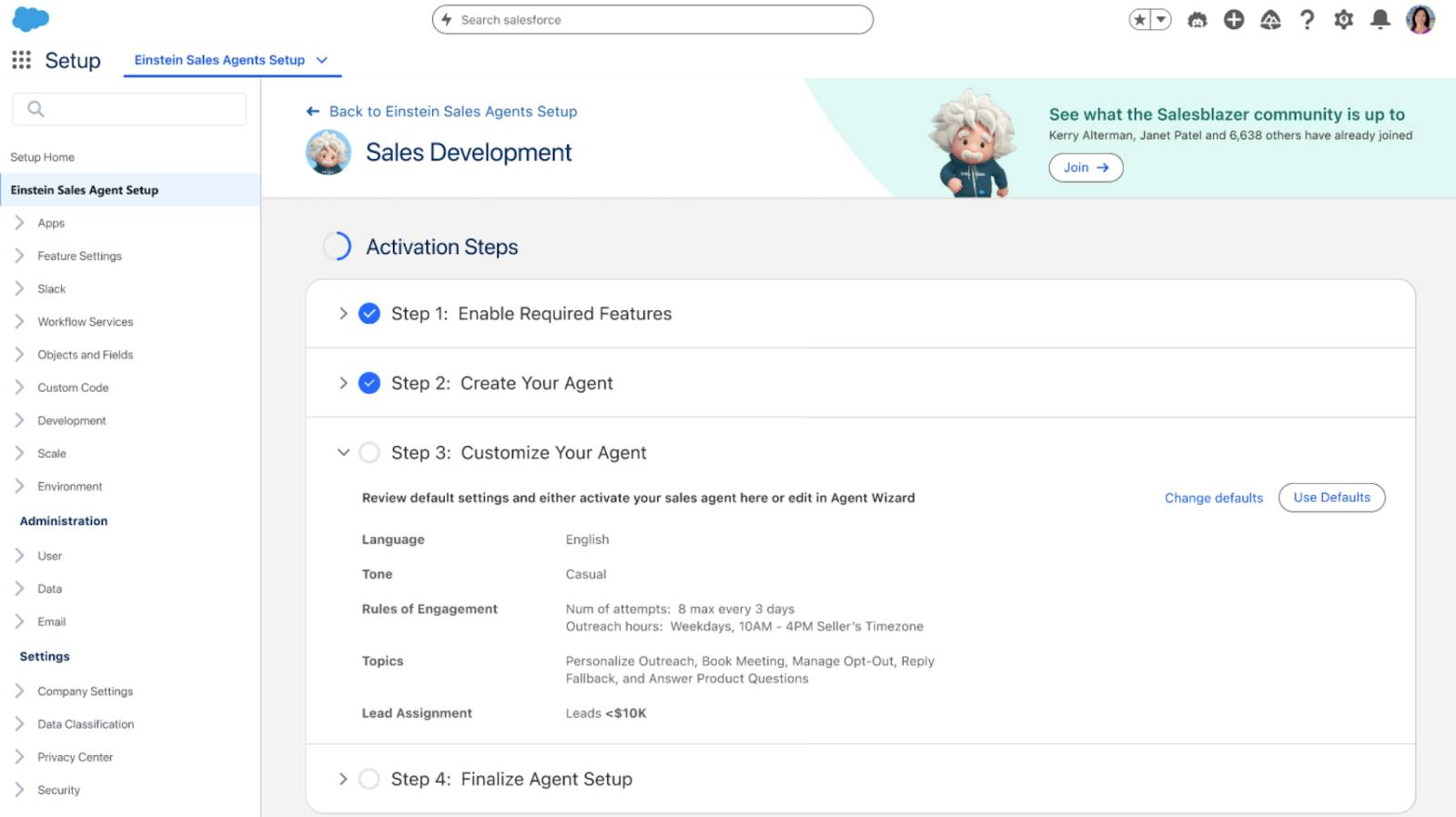Discover Agentforce
Learning Objectives
After completing this unit, you’ll be able to:
- Define an autonomous agent.
- Explain how Agentforce helps get work done.
Meet Agentforce
Agents are autonomous, proactive applications designed to execute specialized tasks to help employees and customers. Agents use large language models (LLMs) to analyze and understand the full context of customer interactions or an automated trigger, then reason through decisions on the next steps autonomously.
These agents generate responses that are consistent with your company’s brand voice and guidelines using trusted business data, including Salesforce CRM data, external data from Data 360, and more. These agents are capable of operating 24/7 across various platforms like self-service portals and messaging channels, handling tasks proactively within set guardrails. When faced with complex issues beyond their scope, they can escalate the matter to human agents, ensuring that queries are resolved efficiently and accurately.
The Agentforce out-of-the-box agents are easy to customize and deploy with clicks, not code. They can be set up in minutes, are easily scalable, and work around the clock across any channel. Here are just some of the agents available.

-
Service Agent replaces traditional chatbots with AI that can handle a wide range of service issues without preprogrammed scenarios, improving customer service efficiency.
-
Sales Development Representative (SDR) engages with prospects 24/7, answering questions, managing objections, and scheduling meetings based on CRM and external data, allowing your sellers to focus on building deeper customer relationships.
-
Sales Coach provides personalized role-play sessions for your sales team, using Salesforce data and generative AI to help sellers practice pitches and objections tailored to specific deals.
-
Merchandiser assists your ecommerce merchandisers with site setup, goal setting, personalized promotions, product descriptions, and data-driven insights, simplifying daily tasks.
-
Buyer Agent enhances the B2B buying experience, helping your buyers find products, make purchases, and track orders via chat or within sales portals.
-
Personal Shopper acts as a digital concierge on your ecommerce sites or messaging apps, offering personalized product recommendations and assisting with search queries.
-
Campaign Optimizer automates the full campaign lifecycle, using AI to analyze, generate, personalize, and optimize marketing campaigns based on business goals.
-
Agentforce supports employees in the flow of their work with specific tasks by searching for data, creating action plans, and executing them to increase workplace efficiency.
Key Components of an Agent
Each agent has parameters that define the job it can do and the action it can take.
-
Role: An agent’s purpose. This defines the job to be done and the broader goals the agent should achieve on your team.
-
Knowledge: The data an agent needs to be successful. This could include company knowledge articles, CRM data, external data via Data 360, public websites, and so on.
-
Actions: The goals an agent can fulfill. This is the predefined task an agent can execute to do its job based on a trigger or instruction. For example, it could run a flow, prompt template, or Apex.
-
Guardrails: The guidelines an agent can operate under. These can be natural-language instructions telling the agent what it can and can’t do, when to escalate to a human, or could come from built-in security features in the Einstein Trust Layer.
-
Channels: The applications where an agent gets work done. This can be your website, CRM, mobile app, Slack, and more.
Agentforce Reasoning Engine, the Brain of an Agent
The Agentforce Reasoning Engine is designed to enhance user interaction through faster, more capable, and more multi-turn conversations. Here’s a brief overview and key features.
-
Multi-turn chat: The reasoning engine facilitates interactive communication with users by considering and adapting to added conversational context, enhancing the accuracy of the service provided.
-
Topic classification: The reasoning engine classifies user utterances into topics based on predefined descriptions, ensuring relevant responses.
-
Instructions and actions: Each topic includes specific instructions and actions, such as verifying order details or obtaining further information, to assist users accurately and efficiently.
-
Knowledge Retrieval: The reasoning engine uses multiple techniques including advanced retrieval augmentation generation (RAG) which selectively uses multiple language models to iteratively refine the quality of queries, retrieving the most relevant knowledge chunks, while also evaluating the quality of the response.
-
Searchable public data: Agents can now securely access public data through the Einstein Trust Layer, expanding its knowledge base.
How an Agent Takes Action
Agents take action and adhere to guardrails using natural language descriptions that outline the tasks and operational boundaries. Here's a summary of how they operate.
- The agent first receives a trigger, which can be a conversation with an employee or customer, a change in data, or an automation.
- The agent uses the LLM and natural language descriptions to identify the context and select a topic that best fits the job to be done, including the scope, data required, and necessary conditions.
- Depending on the task, an agent selects and chains actions. Those actions are executed via flows, apex classes, APIs, or direct prompts.
- Agents dynamically plan and execute tasks while strictly following predefined guardrails. They also have built-in mechanisms for harm and toxicity detection, using the Einstein Trust Layer, ensuring they avoid engaging in inappropriate or harmful activities.
Now you know a little about Agents, what they do, and how they do it. To learn more, see the Trailhead content listed in Resources—which includes an opportunity to get hands-on and build an agent.